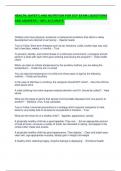HEALTH, SAFETY, AND NUTRITION FOR DCF EXAM | QUESTIONS
AND ANSWERS | 100% ACCURATE.
Children who have physical, emotional, or behavioral conditions that affect or delay
development are referred to as having: - Special needs
True or False: Short term illnesses such as ear infections, colds, broken legs may only
last a few days, weeks, or months - True
To prevent, identify, and control illness in a child care environment, a caregiver should
perform a what with each child upon entering and leaving the program? - Daily health
check
When you take an infants temperature by the auxiliary method, you are taking the
temperature: - Under the arm or armpit
You can take the temperature of a child over three years of age by the following
method: - Orally and auxiliary
In the case of diarrhea or vomiting, the caregiver should NOT what? - Give the child an
adult sports drink
A child suffering from what requires medical attention and 911 should be called? - Heat
stroke
What are the types of germs that spread communicable diseases from one person to
another? - Bacteria, virus, fungi, parasites
True or False: Universal precautions is a strategy which requires caregivers to treat
blood or any bodily fluid of all persons as potential of infection - True
What are the three As of a healthy child? - Appetite, appearance, activity
A physically healthy child has a good appetite. They can: - Eat an appropriate amount
of food at times, consume a vareity of foods, be interested in eating, and appear to be
content after meals and snacks
A physically healthy child has good appearance. They display: - Clear and bright eyes,
clear skin, age-appropriate muscles, steady gain in height and weight
A healthy child, reflecting happy, cheerful feelings is displaying: - Emotional health
, A child who is friendly most of the time, interacts with other children, enjoys quiet
activities that require concentration is displaying: - Social health
True or False: The best way to take temperature is to use a digital thermometer with a
disposable sheath - True
True or False: For mild diarrhea, give the child milk to drink - False
True or False: For both diarrhea and vomiting, stop the child's normal diet and give
electrolytes - True
Hib is an infection that can lead to other conditions which can cause secondary
infections in many area of the body including: - Meningitis, pneumonia, epiglottis
infection
True or False: Hepatitis B and C are diseases of the liver - True
Conjunctivitis is: - Pink eye
Proper defrosting of food items is displayed by: - A slowly thawing of frozen food
products under refrigeration, thawing food completely submerged under water, food
product must be completely cooked within four hours, thawing in a microwave oven
Cross-contamination occurs through: - Dirty hands, food contact surfaces, knives and
utensils, storing raw products above cooked food in the refrigerator, etc.
True or False: Antibiotics have no effect on a virus - True
True or False: Common examples of parasites are pin worms, roundworms, and head
lice - True
True or False: The eggs of head lice are called nits - True
Methods through which diseases are transmitted are: - Respiratory, fecal/oral, direct
contact, blood borne
A child should be isolated if you see: - Severe coughing, diarrhea, pink eye, exposed or
open skin lesions
True or False: Each child must have a current record of immunization history and health
record on file at the child care program - True
For proper food handling in preventing illness, good sanitation requires: - Clean utensils
and equipment, wholesome food, correct storage and cooking temperatures, safe food
handling practices




